
U.S. citizens can legally work in Mexico by obtaining the right visa, residency, or citizenship. Options include temporary/permanent residency, work permits through employers, or claiming Mexican nationality through parents. Each path depends on your heritage, family ties, and work goals.
Working in Mexico as an American comes with multiple pathways. Some qualify through Mexican parents or grandparents, others through employer sponsorship, marriage, or financial solvency. Each path comes with different requirements, costs, and timelines, but the good news is there are multiple doors open.
Doble Nacionalidad Express (DNExpress) specializes in helping U.S. citizens of Mexican descent secure their nationality, passports, and legal documents, often without ever stepping foot inside a consulate. That means faster approvals, fewer headaches, and a clear path to legally live and work in Mexico.
If you want the full breakdown of visas, jobs, salaries, and insider tips on avoiding common mistakes, keep reading. We'll cover everything step by step.
Do Americans Need Permission to Work in Mexico?
Yes. U.S. citizens need citizenship, residency, or a work visa to legally work in Mexico.
Unlike tourist entry, which only allows short stays without pay, work and long-term living require formal status. The path you take depends on your personal situation:
Claim dual citizenship (heritage/family): If you were born in the U.S. but your parents or grandparents were born in Mexico, you may already qualify for nationality. Mexican citizenship is the fastest, most powerful option since it eliminates the need for visas or work permits altogether.
Marry a Mexican citizen: Spouses of Mexican nationals can apply for residency with work authorization. This is one of the most direct ways to gain the right to live and work without relying on an employer.
Apply through employer sponsorship: If you receive a job offer from a Mexican company, the employer begins the permit process with Instituto Nacional de Migración (INM). You'll need a contract, consular approval, and to exchange your entry visa for a resident card once inside Mexico.
Show economic solvency: For remote workers, retirees, and entrepreneurs who won't rely on a Mexican paycheck, Temporary Residency is available by proving steady income or savings. This unlocks legal living in Mexico and with an added step, permission to work if needed.
Note: Tourist status is not enough. Many Americans assume they can “work online” in Mexico without paperwork, but the government distinguishes between foreign-sourced income and Mexico-based employment. If your income comes from a Mexican entity or clients, you'll need explicit permission to work.

Main Paths to Work in Mexico
There's no single “work visa” for Americans moving to Mexico.
Instead, your options fall into three main categories: employer sponsorship, residency permits, or family-based citizenship. Each comes with its own requirements and benefits.
Work Visas (Employer-Sponsored)
If you're hired by a company in Mexico, whether to teach English, work in tech, or support NGOs, your employer initiates the process.
The company must request permission from Instituto Nacional de Migración (INM), Mexico's immigration office, before you can legally begin.
You'll receive a job offer and work contract.
The employer files the application with INM.
You attend a Mexican consulate appointment to finalize approval.
Once you arrive in Mexico, you must exchange your entry visa for a residency card within 30 days. Note that four-year work permits are now available for qualified professionals.
This pathway ties your right to work directly to your employer, so switching jobs often requires reapplying.
Residency Options
Many U.S. citizens choose Mexican residency, which provides flexibility beyond a single employer.
Temporary Residency (TR): Valid for one year and renewable for up to four years. You can add “permission to work” to TR if you want to earn from Mexican sources.
Permanent Residency (PR): Usually available after four years of TR or through qualifying family ties. PR allows you to live and work indefinitely without separate work permits, and it grants nearly all the rights of citizenship (except voting).
Residency is also a popular choice for remote workers or retirees who meet Mexico's economic solvency requirements.
Citizenship via Family
For many Americans with Mexican parents or grandparents, citizenship is the most powerful path.
Instead of juggling visas or residency renewals, you can claim nationality outright. Under Mexico's dual nationality laws, once you have your Mexican birth certificate, CURP, and passport, you have the same rights as any other citizen, including unrestricted work and property ownership.
Doble Nacionalidad Express (DNExpress) specializes in this area. We help U.S.-born children of Mexican parents or grandparents secure their nationality quickly, often without a single consulate visit. For families, this option not only opens work opportunities but also guarantees that future generations can inherit Mexican nationality.

What Jobs Can Americans Get in Mexico?
Finding work in Mexico as a U.S. citizen depends on your skills, language ability, and whether you're seeking local employment or planning to bring your income with you.
High-Demand Fields for U.S. Citizens
English Teachers: Language schools, universities, and private academies consistently hire native English speakers. Many Americans succeed here even without fluent Spanish, though higher-paying roles often require certifications like TEFL or CELTA.
IT & Tech: Mexico's growing tech hubs, Guadalajara, Monterrey, Mexico City, welcome software developers, engineers, and IT professionals, often through multinational companies.
Tourism & Hospitality: Resorts, hotels, and travel companies hire English speakers for guest relations, marketing, and management roles.
Call Centers & Customer Support: Bilingual skills are in high demand. Some U.S. companies operate cross-border call centers in cities like Tijuana and Monterrey.
Healthcare & NGOs: Opportunities exist for specialists, especially in international organizations or partnerships.
Remote Work Opportunities
One of the most popular paths is keeping a U.S.-based job while living in Mexico.
Many Americans continue working remotely for U.S. employers, enjoying a lower cost of living without depending on Mexican wages. However, it's critical to check your employer's policies and understand the tax implications, as some industries (like healthcare or finance) restrict work abroad due to compliance or data security rules.
Entrepreneurship in Mexico
Mexico also welcomes Americans who want to create their own opportunities:
Owning a business: From restaurants to digital startups, foreigners can open and operate companies, provided they meet legal and tax requirements.
Properties: While some restrictions apply near borders and coastlines, owning property through trusts or corporations is common.
Freelancing: Many Americans offer services online while living in Mexico, from digital marketing to design and consulting.
Insider Tip: While entry-level teaching and call center jobs are accessible without Spanish, Spanish fluency unlocks better pay and career advancement. That's why many Americans prefer to rely on remote U.S. income or dual citizenship, which allows them to compete more fully in Mexico's job market.
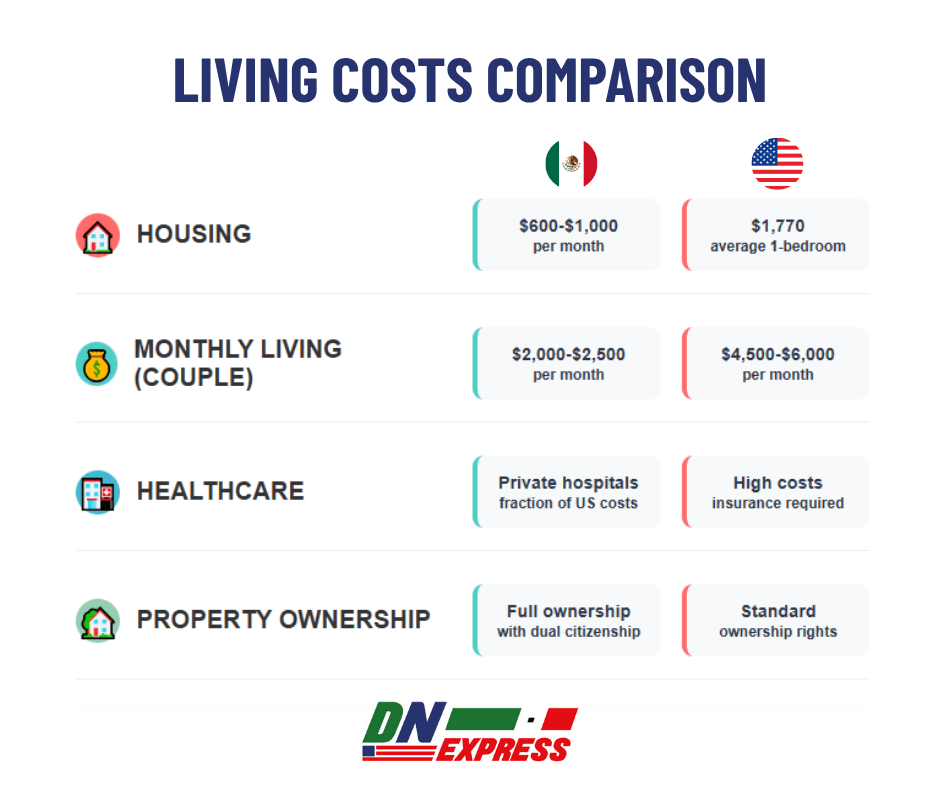
Cost of Living & Salaries
One of the main reasons U.S. citizens consider moving to Mexico is affordability.
But while the cost of living is lower, salaries are also much lower compared to the United States. Learning this balance is key before making the move.
Average Salaries in Mexico
Typical local wages: $12,000-$15,000 MXN per month ($700-$900 USD).
Higher-paying roles: $25,000-$40,000 MXN per month ($1,500-$2,300 USD), usually in specialized industries like IT, international business, or executive positions.
💡 For context, many Americans continue working for U.S. companies remotely while living in Mexico, which helps them avoid the wage gap and maintain a higher standard of living.
Cost of Living for Americans
Living in Mexico on $3,000 USD per month is considered very comfortable.
That budget usually covers rent, utilities, groceries, transportation, eating out, and leisure activities. Many expats live well on less, especially outside of Mexico City.
Rent Examples
Mexico City (Polanco, Condesa, Roma): $800-$1,500 USD for modern apartments in expat-friendly neighborhoods.
Smaller cities or towns (Puebla, Mérida, San Luis Potosí): $400-$700 USD for comfortable housing.
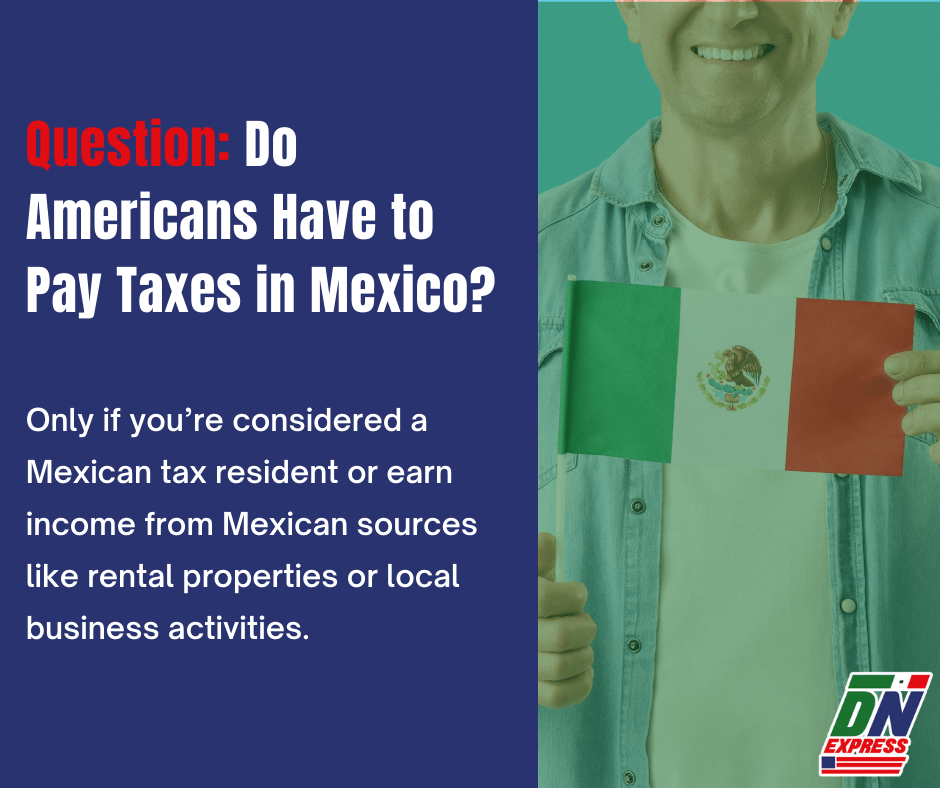
The Big Worry: Earning in Pesos vs. Dollars
Many Americans fear earning too little in pesos to sustain their lifestyle.
While local wages can support basic living, they don't always match U.S. expectations. That's why so many expats keep U.S.-based income streams, either through remote work or by claiming Mexican citizenship, which opens business and property opportunities without restrictions.
Everyday Challenges Americans Ask About
Even after learning the basics, many U.S. citizens still have practical questions about working in Mexico.
Here are some of the most frequent ones I hear:
Am I legally allowed to work in Mexico as a tourist?
No. Tourist visas only allow non-paid activities like vacations or short business meetings.
If you take paid work while on a tourist stamp, you risk fines or deportation. To work legally, you'll need citizenship, residency, or a work visa.
Can I get a job without Spanish?
Yes, but options are limited.
Most opportunities without Spanish involve English teaching, call centers, or remote jobs with U.S. employers. For better-paying roles in business, IT, or management, Spanish fluency is usually required.
Are there English-speaking jobs in Mexico?
They exist, but they're not as widespread as people think.
International schools, global corporations, and tourism hubs often recruit English speakers. Still, learning at least conversational Spanish is the best way to expand your opportunities and integrate into the workplace.
How do I find jobs in Mexico?
Many foreigners find jobs through:
- Expat networks (local Facebook groups, expat meetups).
- LinkedIn Mexico, which is widely used by recruiters.
- Direct applications to international schools, hotels, or companies with U.S. ties.
If you already have U.S. income, combining remote work with Mexican residency or citizenship often provides the best balance: legal security, higher earnings, and full access to Mexico's services.
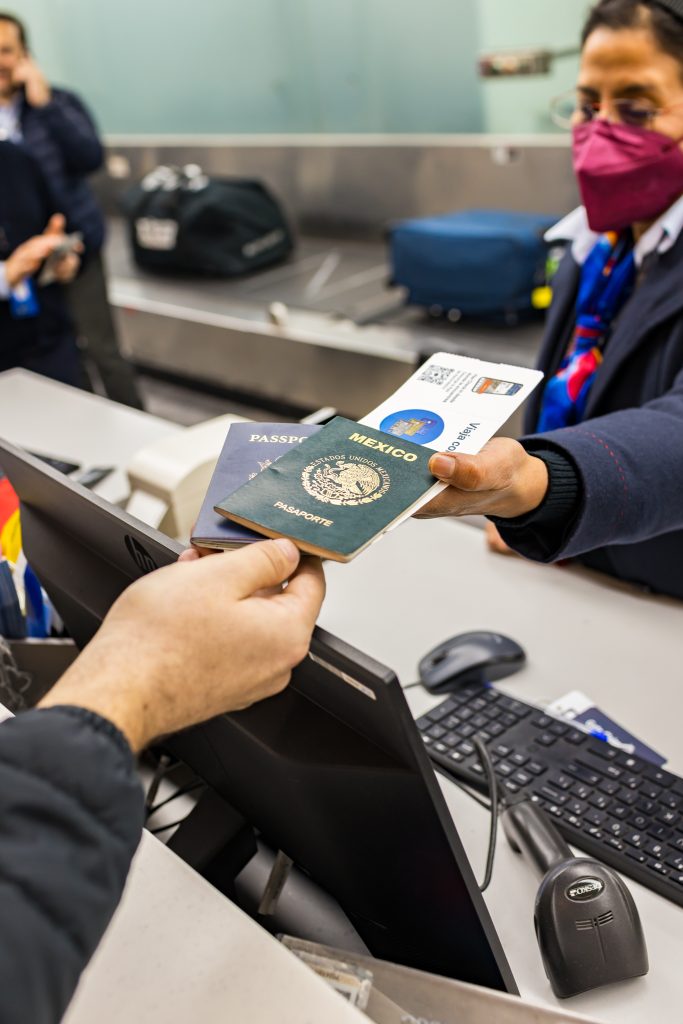
Frequent Worries from U.S. Citizens
Making the leap to live and work in Mexico is exciting, but it also comes with genuine concerns that Americans share over and over again.
Fear of Bureaucracy
Mexican consulates are infamous for long waits, inconsistent rules, and conflicting information.
One office may approve an application easily, while another denies it for technicalities. This uncertainty makes many hesitant to even begin the process.
Concern About Low Wages
Compared to U.S. salaries, Mexican wages often feel discouraging.
Americans worry they won't be able to maintain their standard of living if they depend solely on local income. That's why remote U.S. work and dual citizenship are such popular solutions, they allow you to live affordably without sacrificing earnings.
Family and Education Challenges
For families with children, the move goes beyond jobs.
Parents worry about school transitions, language barriers, and access to healthcare. These are valid concerns, but with planning, many families thrive by enrolling kids in bilingual schools and securing private health coverage.
The Risk of Denial or Document Errors
Perhaps the biggest fear is: “What if I'm denied?”
Small errors, like a name mismatch on a birth certificate, can derail an application. Many Americans give up after one rejection, not realizing the problem is often fixable. With the right legal help, denials can be overturned and documents corrected.
For guidance on document requirements, check our comprehensive checklist for moving to Mexico.
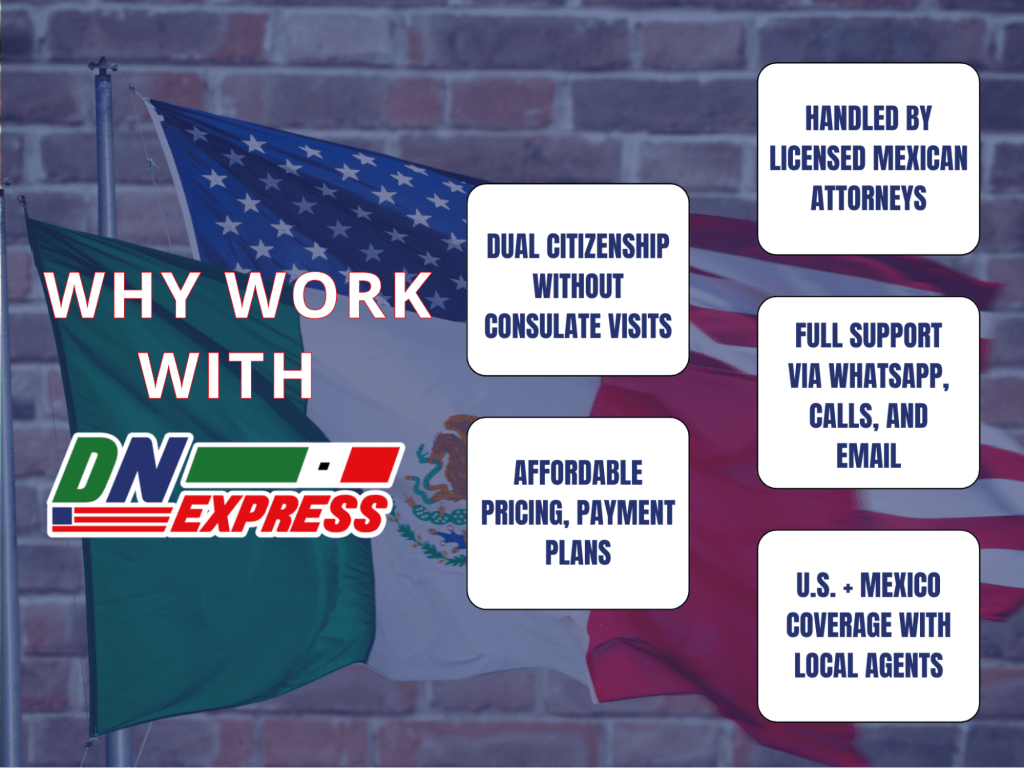
Why Work with DNExpress Instead of DIY
When it comes to securing the right to work in Mexico, the difference between doing it yourself and working with professionals can mean months of frustration or peace of mind from the very start.
Why Choose DNExpress
✅ Licensed Mexican attorneys: Every case is handled by qualified attorneys, not document processors. You get legal protection and accurate guidance in both U.S. and Mexican law.
✅ No consulate visits required: We process everything remotely, saving you from long lines and inconsistent rules.
✅ Affordable and transparent pricing: Fixed fees, payment plans, and no hidden charges make this process accessible for families.
✅ Specialists in difficult cases: Rejections, errors, or missing documents? We specialize in the cases others say are “impossible.”
✅ Full U.S.-Mexico coverage: With offices and agents on both sides of the border, we can track down records anywhere in Mexico.
The Risks of DIY
Trying to navigate the process on your own often leads to:
⚠️ Document errors that trigger rejection, even a small name mismatch can derail your application.
⚠️ Wasted trips and money flying to Mexico to chase down birth certificates or registry records.
⚠️ Months of waiting for consulate appointments that may end in confusion or denial.
⚠️ Believing “no” means the end, when in reality, the right legal fix can turn it into a “yes.”
Doble Nacionalidad Express has helped thousands of Americans reclaim their Mexican identity, secure passports, and unlock legal work opportunities quickly, safely, and without the stress of doing it alone.
We also provide certified document translation services y Mexican passport renewal assistance for existing citizens.
Next Steps
If you're serious about working in Mexico, the first step is knowing which path is right for you: citizenship, residency, or a work permit.
The process doesn't have to be confusing or overwhelming.
👉 Schedule a Free Case Review with DNExpress. In a 5-15 minute call, our licensed attorneys can review your documents, answer your questions, and tell you exactly where you stand.
You can Message Us on WhatsApp, call, or email us today, and we'll guide you from start to finish without consulate visits, without wasted time, and with complete transparency.
With the right legal support, you can start working in Mexico with peace of mind, knowing your identity, future, and family opportunities are secure on both sides of the border.
For more information about requirements and processes, review our frequently asked questions section.
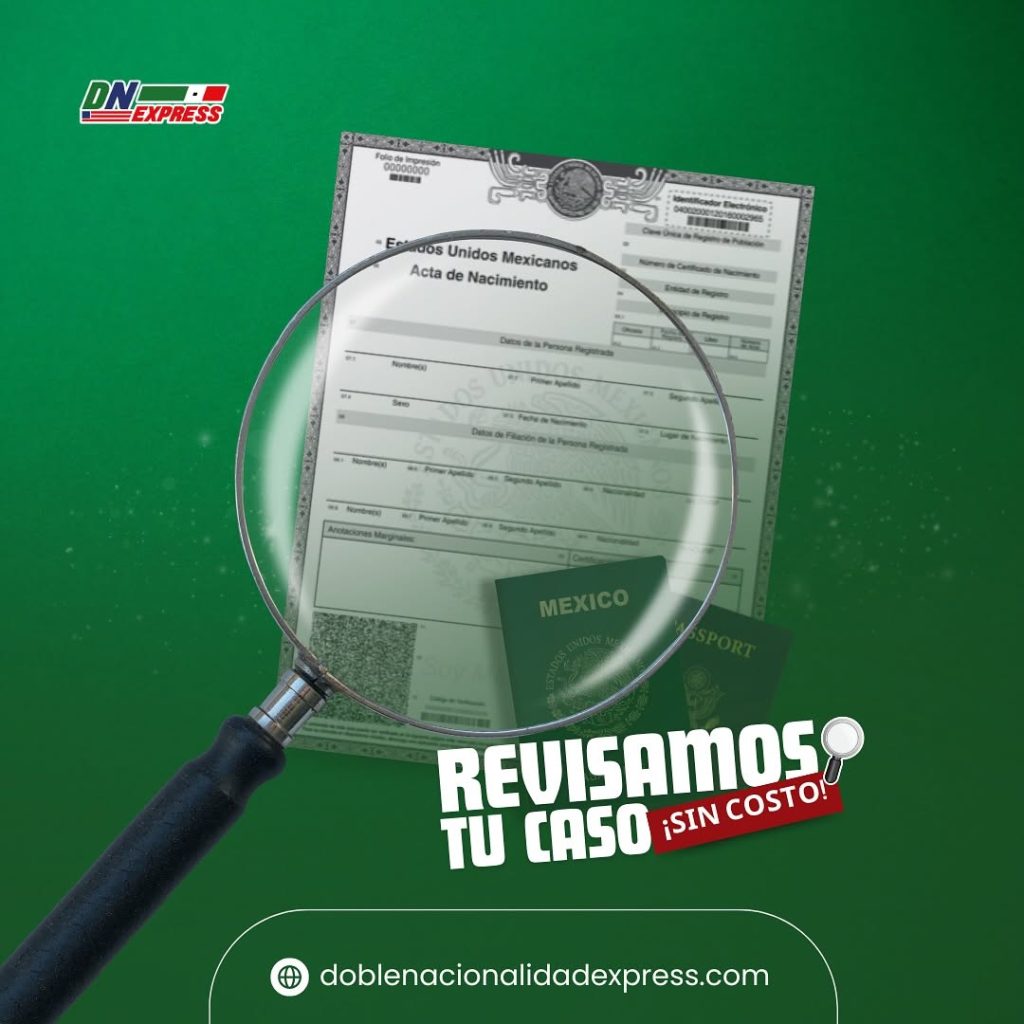
Frequently Asked Questions (FAQ)
How hard is it for an American to work in Mexico?
It depends on your situation.
If you have Mexican parents or grandparents, citizenship is straightforward and eliminates most barriers. Without family ties, you'll need residency or a work visa, which can take a few months but is very achievable with the right documentation.
Can I live in Mexico on $3,000 a month?
Yes, very comfortably.
With $3,000 USD per month, you can cover rent, food, healthcare, transportation, and leisure. Even in Mexico City's expat areas, this budget allows for a high quality of life. In smaller towns, you'll spend much less.
Do I need to speak Spanish to get a job in Mexico?
Not always.
Teaching English, call centers, and some international companies hire English speakers. However, Spanish fluency opens the door to better-paying jobs and smoother integration into the workplace.
What kind of jobs can Americans get in Mexico?
Options include English teaching, IT and tech roles, tourism, call centers, and healthcare.
Many Americans also work remotely for U.S. employers or start their own businesses in Mexico.
Can I work in Mexico if I only have a tourist visa?
No. A tourist visa only allows non-paid activities.
To legally work, you need either Mexican citizenship, temporary or permanent residency with work authorization, or an employer-sponsored work permit.
Before making any major decisions, check the U.S. State Department's travel advisory for Mexico for current safety and travel information.



